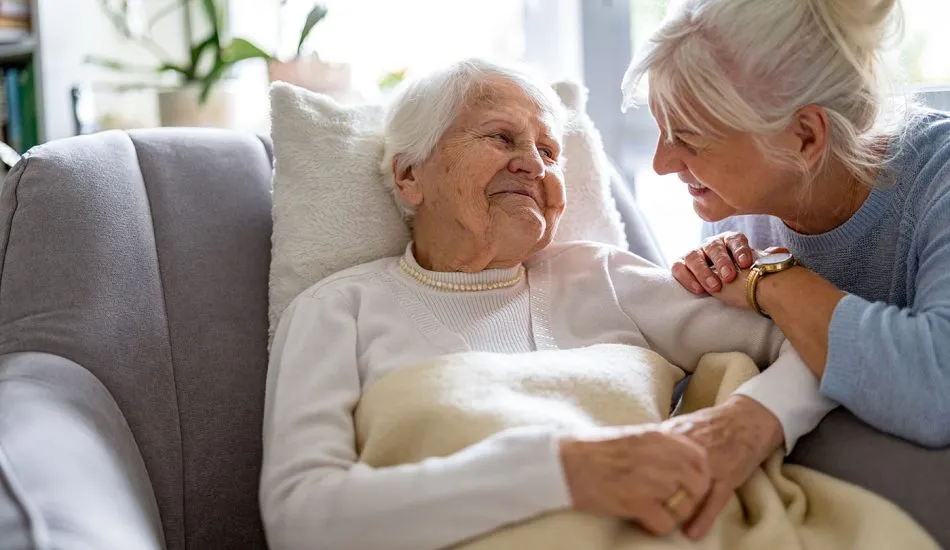When you are choosing a nursing home for your loved one, always visit the facility in person, ask for the facility’s credentials, check staff-to-resident ratios, and make sure the nursing home meets all health and safety standards.
Warning Signs of Nursing Home Abuse: Protecting Your Family

When a loved one starts experiencing health and mobility challenges in the later stages of life, it can be a tough decision to move them into a nursing home. But eventually this choice seems like the best option to ensure the person is receiving the care that they deserve. While there are many reputable and quality nursing homes out there, families must use caution because of the risks of nursing home abuse.
The unfortunate truth is that we need to protect elderly family members from abuse and neglect, which might be hard to recognize in the early stages due to the subtle symptoms. The most important thing you can do is learn about the warning signs of nursing home abuse and take a proactive approach to monitoring and caring for your loved one at all times.
In this article, we are taking a deep dive into the most common signs of nursing home neglect and abuse so that you can watch for the issues that could indicate a deeper problem.
Warning Signs of Physical Abuse in Nursing Homes
Watch for any physical signs that your loved one might be abused. Just because an injury occurs it doesn’t necessarily mean that it is abuse or neglect. But if you are noticing frequent injuries, then it’s definitely a warning sign that needs to be considered.
Some of the most common physical warning signs of nursing home abuse include:
- Unexplained Injuries: Are you finding bruises, cuts, burns, or broken bones that have no explanation? If the staff is offering vague information, then these physical symptoms could be an indication that you need to be concerned about nursing home safety and abuse issues.
- Frequent Falls: Even though the risk of falling increases with age, your loved one should be protected against these falls. Frequent falls or accidents might be an indication of unsafe living conditions or inadequate supervision.
- Bedsores: Also known as pressure ulcers, bedsores can happen if an immobile person is neglected in bed. These sores are an indication of improper care.
- Weight Loss: Have you recently noticed a sudden change in the person’s weight? Rapid weight loss could be a health concern, but it could also be one of the signs of nursing home abuse. This symptom could indicate that the person is not getting adequate meals or proper nutrition.
Emotional Warning Signs and Behavioral Issues
The next thing to consider when it comes to protecting your loved one and preventing nursing home abuse is if any warning signs show up in the person’s emotions or behavior. Warning signs might include:
- Unexplained Mood Changes: Have you noticed uncharacteristic mood changes in your loved one? Depression, social withdrawal, irritability, and anxiety are all signs that the person might be under the pressure of nursing home abuse.
- Discomfort Around Caregivers: Pay attention to how the person responds when their caregivers are present. If you notice any fear or anxiety around specific caregivers, then it could be a sign that they are being abused or mistreated. Watch for these symptoms around all caregivers, even if it is a family caregiver.
- Isolation: Have you noticed more isolation so the person is getting less interaction with family and friends? Sometimes abusers limit the interactions or visits with loved ones. They are trying to prevent communication in an attempt to hide the signs of abuse.
Warning Signs of Neglect
While abuse involves intentional mistreatment or harm, neglect is a little different. If your loved one is a victim of neglect, then it means that there is a failure to provide the person with necessary care – leading to unsafe conditions, physical issues, or harm. The biggest difference between nursing home abuse and neglect is that abuse is deliberate and active, while neglect is usually passive (such as inadequate care or attention).
Signs of neglect include:
- Poor hygiene, such as dirty clothes or a lack of bathing and grooming.
- Unsanitary living conditions, including dirty rooms, a poorly maintained facility, or soiled bedding.
- Lack of medical attention, missed medications, or untreated infections.
Warning Signs of Financial Abuse
Even if the person is in good health and receiving proper physical care, there is a risk of financial exploitation. When caregivers have access to the person’s valuables and financial accounts, then financial abuse can occur if the caregiver starts using these funds improperly.
Signs of financial exploitation include:
- Unexplained credit card charges or bank withdrawals.
- Changes in financial documents or the person’s will.
- Missing items from the person’s room or house.
Signs of Verbal, Emotional, or Psychological Abuse
Even though no physical harm is being done, mental or emotional abuse is still a big concern. Signs of this type of abuse include:
- Caregivers talking to the person in a harsh way, such as yelling, belittling, or threats.
- Emotional manipulation that leads to fear or dependency on caregivers.
- Sudden change in communication, such as the person becoming very quiet or no longer talking with family members.
What Families Need to Know to Prevent Nursing Home Abuse
Every family needs to know how to protect elderly loved ones. While the hope is that your family member is in a safe and supportive nursing home, it’s important that you are educated about resident rights.
Know about the nursing home regulations that are in place and ensure that staff members are following these requirements. Check-in on your loved one regularly. Watch for signs of nursing home abuse and report any suspicious activities as soon as possible. Not only will reporting protect your loved one, but it could also prevent nursing home abuse against other residents in the facility.
FAQ
Call the Experts to Talk to an Elder Abuse Attorney
If you need legal support, then Gainsburgh, Benjamin, David, Meunier & Warshauer, L.L.C. is here to help. Call our team for a consultation and legal representation: (504) 522-2304.




